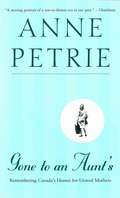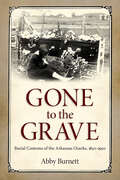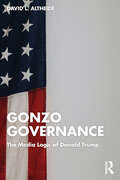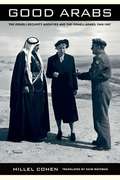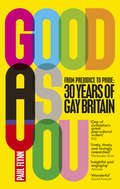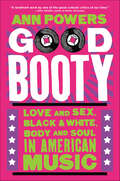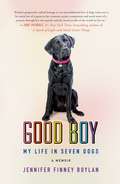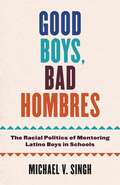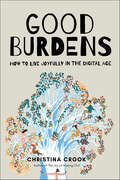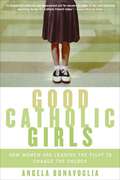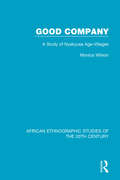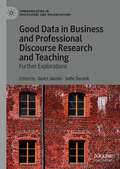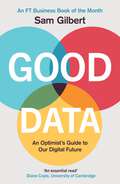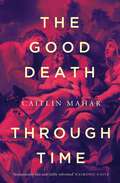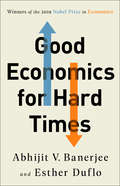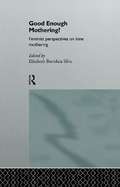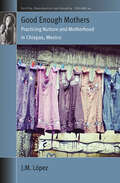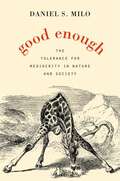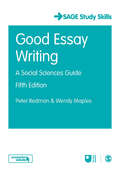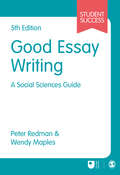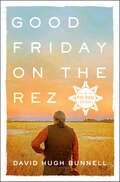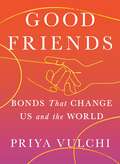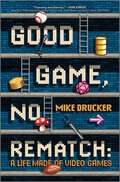- Table View
- List View
Gone to New York: Adventures in the City
by Ian FrazierA collection of essays of Ian Frazier which begins with a couple of Talk pieces and ends with his memory of Hudson, Ohio.
Gone to an Aunt's: Remembering Canada's Homes for Unwed Mothers
by Anne PetrieThirty or forty years ago, everybody knew what that phrase meant: a girl or a young, unmarried woman had gotten herself pregnant. She was “in trouble. ” She had brought indescribable shame on herself and her family. In those days it was unthinkable that she would have her child and keep it. Instead she had to hide. Most likely she would be sent away to a home for unwed mothers, where she would stay in secrecy until her baby was born and given up for adoption. “Gone to an aunt’s” was the usual cover story, a fiction that everyone understood but no on talked about –until now. InGone to an Aunt’s,journalist and long-time television host Anne Petrie takes us back into these homes for unwed mothers. Most cities in Canada had at least one home, several as many as five or six, most of them run by religious organizations. Here, in institutional settings, the girls were kept out of sight until their time was up and they could return to the world as if nothing had happened. Seven women –including the author – recount their experiences inGone to an Aunt’s,talking openly, some for the first time, about how they got pregnant; the reaction of their parents, friends, boyfriends, and lovers; why they wound up in a home; and how they managed to cope with its rules and regulations –no last names, no talking about the past –and the promise of salvation that could come only through work and prayer. Gone to an Aunt’sis a profoundly moving and compassionate –even alarming – account. It comes as a reminder that we not get too wistful for the supposedly innocent times before the sexual revolution. That innocence, Petrie shows vividly, was a charade made believable only because the thousands of girls who had broken the rules were hidden away.
Gone to the Grave: Burial Customs of the Arkansas Ozarks, 1850-1950
by Abby BurnettBefore there was a death care industry where professional funeral directors offered embalming and other services, residents of the Arkansas Ozarks—and, for that matter, people throughout the South—buried their own dead. Every part of the complicated, labor-intensive process was handled within the deceased's community. This process included preparation of the body for burial, making a wooden coffin, digging the grave, and overseeing the burial ceremony, as well as observing a wide variety of customs and superstitions. These traditions, especially in rural communities, remained the norm up through the end of World War II, after which a variety of factors, primarily the loss of manpower and the rise of the funeral industry, brought about the end of most customs. Gone to the Grave, a meticulous autopsy of this now vanished way of life and death, documents mourning and practical rituals through interviews, diaries and reminiscences, obituaries, and a wide variety of other sources. Abby Burnett covers attempts to stave off death; passings that, for various reasons, could not be mourned according to tradition; factors contributing to high maternal and infant mortality; and the ways in which loss was expressed though obituaries and epitaphs. A concluding chapter examines early undertaking practices and the many angles funeral industry professionals worked to convince the public of the need for their services.
Gonzo Governance: The Media Logic of Donald Trump
by David L. AltheideDrawing on social science and communications theory, Gonzo Governance offers a new interpretation of Presidential power that shifts focus to the media dynamics that surrounded Donald Trump. The former President’s unhinged behavior and skilled media and digital manipulations changed the nature and process of significant governance at the federal and state levels, including denying election results and restricting voting opportunities. He went ‘Gonzo’ – promoting himself without regard for conventional norms and practices – and blasted ideological fault lines into explosive political fragments, resulting in so much dissensus that numerous legislators would not recognize the newly elected President Biden, nor would they agree to take a potential life-saving vaccine because it had been associated with a politicized virus, Covid-19. Nurtured by media logic and a communications ecology that has wedded people to digital technologies and formats that govern the structure, grammar, form, expectations, and meanings of messages that can entertain, enlighten, and disinform, this form of governance alters the fundamental way that information is communicated. David L. Altheide emphasizes how these changes informed Donald Trump’s electoral strategies as well as the insurrection attempt on the U.S. Capitol on January 6, 2021.
Good Arabs: The Israeli Security Agencies and the Israeli Arabs, 1948-1967
by Haim Watzman Hillel CohenExposing the full extent of the crucial, and, until now, willfully hidden history of Palestinian collaboration with Israelis and of the Arab resistance to it, the book brings together the stories of activists, mukhtars, collaborators, teachers, and sheikhs.
Good As You: From Prejudice to Pride – 30 Years of Gay Britain
by Paul Flynn‘One of the most important books about gay culture in recent times’ The QuietusLong-listed for the Polari First Book PrizeIn 1984 the pulsing electronics and soft vocals of Smalltown Boy would become an anthem uniting gay men. A month later, an aggressive virus, HIV, would be identified and a climate of panic and fear would spread across the nation, marginalising an already ostracised community. Yet, out of this terror would come tenderness and 30 years later, the long road to gay equality would climax with the passing of same sex marriage.Paul Flynn charts this astonishing pop cultural and societal U-turn via the cultural milestones that effected change—from Manchester’s self-selection as Britain’s gay capital to the real-time romance of Elton John and David Furnish’s eventual marriage. Including candid interviews from major protagonists, such as Kylie, Russell T Davies, Will Young, Holly Johnson and Lord Chris Smith, as well as the relative unknowns crucial to the gay community, we see how an unlikely group of bedfellows fought for equality both front of stage and in the wings.This is the story of Britain’s brothers, cousins and sons. Sometimes it is the story of their fathers and husbands. It is one of public outrage and personal loss, the (not always legal) highs and the desperate lows, and the final collective victory as gay men were final recognised, as Good As You.
Good Booty: Love and Sex, Black & White, Body and Soul in American Music
by Ann PowersNPR Best Books of 2017In this sweeping history of popular music in the United States, NPR’s acclaimed music critic examines how popular music shapes fundamental American ideas and beliefs, allowing us to communicate difficult emotions and truths about our most fraught social issues, most notably sex and race.In Good Booty, Ann Powers explores how popular music became America’s primary erotic art form. Powers takes us from nineteenth-century New Orleans through dance-crazed Jazz Age New York to the teen scream years of mid-twentieth century rock-and-roll to the cutting-edge adventures of today’s web-based pop stars. Drawing on her deep knowledge and insights on gender and sexuality, Powers recounts stories of forbidden lovers, wild shimmy-shakers, orgasmic gospel singers, countercultural perverts, soft-rock sensitivos, punk Puritans, and the cyborg known as Britney Spears to illuminate how eroticism—not merely sex, but love, bodily freedom, and liberating joy—became entwined within the rhythms and melodies of American song. This cohesion, she reveals, touches the heart of America's anxieties and hopes about race, feminism, marriage, youth, and freedom. In a survey that spans more than a century of music, Powers both heralds little known artists such as Florence Mills, a contemporary of Josephine Baker, and gospel queen Dorothy Love Coates, and sheds new light on artists we think we know well, from the Beatles and Jim Morrison to Madonna and Beyoncé. In telling the history of how American popular music and sexuality intersect—a magnum opus over two decades in the making—Powers offers new insights into our nation psyche and our soul.
Good Boy: My Life in Seven Dogs
by Jennifer Finney BoylanFrom bestselling author of She’s Not There, New York Times opinion columnist, and human rights activist Jennifer Finney Boylan, Good Boy: My Life in Seven Dogs, a memoir of the transformative power of loving dogs.This is a book about dogs: the love we have for them, and the way that love helps us understand the people we have been. It’s in the love of dogs, and my love for them, that I can best now take the measure of the child I once was, and the bottomless, unfathomable desires that once haunted me.There are times when it is hard for me to fully remember that love, which was once so fragile, and so fierce. Sometimes it seems to fade before me, like breath on a mirror.But I remember the dogs. In her New York Times opinion column, Jennifer Finney Boylan wrote about her relationship with her beloved dog Indigo, and her wise, funny, heartbreaking piece went viral. In Good Boy, Boylan explores what should be the simplest topic in the world, but never is: finding and giving love.Good Boy is a universal account of a remarkable story: showing how a young boy became a middle-aged woman—accompanied at seven crucial moments of growth and transformation by seven memorable dogs. “Everything I know about love,” she writes, “I learned from dogs.” Their love enables us to pull off what seem like impossible feats: to find our way home when we are lost, to live our lives with humor and courage, and above all, to best become our true selves.
Good Boys, Bad Hombres: The Racial Politics of Mentoring Latino Boys in Schools
by Michael V SinghThe unintended consequences of youth empowerment programs for Latino boys Educational research has long documented the politics of punishment for boys and young men of color in schools—but what about the politics of empowerment and inclusion? In Good Boys, Bad Hombres, Michael V. Singh focuses on this aspect of youth control in schools, asking on whose terms a positive Latino manhood gets to be envisioned. Based on two years of ethnographic research in an urban school district in California, Good Boys, Bad Hombres examines Latino Male Success, a school-based mentorship program for Latino boys. Instead of attempting to shape these boys&’ lives through the threat of punishment, the program aims to provide an &“invitation to a respectable and productive masculinity&” framed as being rooted in traditional Latinx signifiers of manhood. Singh argues, however, that the promotion of this aspirational form of Latino masculinity is rooted in neoliberal multiculturalism, heteropatriarchy, and anti-Blackness, and that even such empowerment programs can unintentionally reproduce attitudes that paint Latino boys as problematic and in need of control and containment. An insightful gender analysis, Good Boys, Bad Hombres sheds light on how mentorship is a reaction to the alleged crisis of Latino boys and is governed by the perceived remedies of the neoliberal state. Documenting the ways Latino men and boys resist the politics of neoliberal empowerment for new visions of justice, Singh works to deconstruct male empowerment, arguing that new narratives and practices—beyond patriarchal redemption—are necessary for a reimagining of Latino manhood in schools and beyond.
Good Burdens: How to Live Joyfully in the Digital Age
by Christina CrookFrom the “Marie Kondo of Digital” comes a thoughtful book about realigning our energies, increasing intentionality, and prioritizing our well-being in the digital age It’s time we choose joy over fear. Empowerment over anxiety. JOMO over FOMO. How do we get there? By taking up good burdens. The things we’re most proud of in life—the child we’re raising; the marathon we completed; the major project we hit out of the park—these required all of us: all of our attention, all of our love, all of our effort. Could we control the outcome? No. Were we all in? Hell, yes. These effortful pursuits are what digital well-being pioneer Christina Crook calls “good burdens.” In thoughtful prose, “The Marie Kondo of Digital”’s insightful follow-up to the acclaimed The Joy of Missing Out makes the case for increasing intentionality in our day-to-day lives, unlocking the building blocks of joy, and offering concrete solutions for flourishing in the digital age. Using historical data, real-life stories from leading mindful tech leaders, and a rich personal narrative, Good Burdens advocates for a realignment of our energies, online and off, towards effortful pursuits—cultivating relationships, community, and creative projects that bring lasting joy.
Good Catholic Girls: How Women Are Leading the Fight to Change the Church
by Angela BonavogliaThe widely exposed transgressions of priests within the Catholic Church stunned the faithful and sent a new surge of energy through the progressive church reform movement in the United States. Despite the movement's growing profile, the world has only recently learned that Catholic women are the driving force behind reform. Good Catholic Girls is a lively account of these courageous women, as seen through the eyes of an impassioned journalist, Angela Bonavoglia. They include Joan Chittister, the Benedictine nun who refused to obey a Vatican order not to speak at an international conference for women's ordination groups; Mary Ramerman, ordained a Catholic priest before 3,000 jubilant supporters; Frances Kissling, whose fight for women's reproductive rights has shaken the Church at its highest levels; Barbara Blaine, a priest abuse survivor who created the nation's most powerful voice for victims; and Sister Jeannine Gramick, who built a pioneering ministry to gays and lesbians, despite Vatican orders to silence her and ban her work.Backed by supporters worldwide, these and other women are rethinking Catholic theology, changing the face of ministry, and resurrecting the lost lives of female church leaders. As Bonavoglia shows, the hierarchy ignores them at its peril.
Good Citizens Can Help
by Cynthia Swain Tara FunkGood citizens help others. There are many ways to be a good citizen.
Good Company: A Study of Nyakyusa Age-Villages
by Monica WilsonOriginally published in 1951 this book is a study of village system in southern Tanzania, which at the time of publication was thought to be unique. Each village consisted not of a group of kinsmen but an age-set: a group of male contemporaries, together with their wives and young children. The book is concerned with the structure of these villages and the values expressed in them.
Good Data in Business and Professional Discourse Research and Teaching: Further Explorations (Communicating in Professions and Organizations)
by Geert Jacobs Sofie DecockThis edited book engages with the richly interdisciplinary field of business and professional communication, aiming to reconcile the prescriptive ambitions of the US-centred business communication tradition with the more descriptive approach favoured in discourse studies and applied linguistics. A follow-up to the award-winning book The Ins and Outs of Business and Professional Discourse Research (Palgrave Macmillan, 2016), this volume brings together scholars and their recent work from wide-ranging business and professional settings to engage with the question of what counts as good data. The authors focus on four key themes - authenticity, triangulation, background and relevance - to shine a light on business and professional discourse as essential contextual and intertextual. This book will be of interest to scholars working in applied linguistics, sociolinguistics, and business communication, but also other social scientists interested in a range of perspectives on oral, written and digital language use in workplace settings.
Good Data: An Optimist's Guide to Our Digital Future
by Sam GilbertAN FT BUSINESS BOOK OF THE MONTHThe book that will make you rethink everything you thought you knew about data, privacy and the future of Big Tech. 'We are currently living in a moment of extreme pessimism about data. This book will change your mind.' Almost everything we do generates data.Digital technology is now so pervasive that it's very hard to escape its influence, and with that growth comes fear. But whatever the news has told you about data and technology, think again.Data expert and tech insider Sam Gilbert shows that, actually, this data revolution could be the best thing that ever happened to us.Good Data examines the incredible new ways this information explosion is already helping us – whether that's combating inequality, creating jobs, advancing the frontiers of knowledge or protecting us from coronavirus – and explains why the best is yet to come.Data touches everything, from our biggest hates (online advertising) to our greatest loves (our pets), and in this fascinating new book, Gilbert explores how, if we can embrace the revolution (even the ads), we could all live vastly improved lives.We are standing on the edge of greatness, we just need to know how to get there.
Good Death Through Time
by Caitlin Mahar'I have quite a bit of understanding of white man's ways but it is difficult for me to understand this one'. A Senate committee investigation of Australia's Northern Territory Rights of the Terminally Ill Act 1995, the first legislation in the world which allowed doctors to actively assist patients to die, found that for the vast majority of Indigenous Territorians, the idea that a physician - or anyone else - should help end a dying, suffering person's life was so foreign that in some instances it proved almost impossible to translate. This book explores how such a death became a thinkable - even desirable - way to die for so many others in Western cultures. Though 'euthanasia', meaning 'good death', derives from ancient Greece, for the Greeks this was a matter of Fate, or a gift the gods bestowed on the virtuous or simply lucky. Caring for the dying was not part of the doctor's remit. For the Victorians, a good death meant one blessed by God and widespread belief in a divine design and the value of suffering created resistance to new forms of pain relief. And today, while most in the Western world cleave to the modern medical view that pain is an aberration, to be, where possible, eliminated, complex cultural, ethical and practical questions regarding what makes for a good death remain. As Caitlin Mahar memorably shows in The Good Death Through Time, understanding the radical historical shift in Western attitudes to managing dying and suffering helps us better grasp the stakes in today's contestations over what it means to die well.
Good Economics for Hard Times: Six Ways We Get The World Wrong And How To Set It Right
by Esther Duflo Abhijit V. BanerjeeThe winners of the Nobel Prize show how economics, when done right, can help us solve the thorniest social and political problems of our day.Figuring out how to deal with today's critical economic problems is perhaps the great challenge of our time. Much greater than space travel or perhaps even the next revolutionary medical breakthrough, what is at stake is the whole idea of the good life as we have known it.Immigration and inequality, globalization and technological disruption, slowing growth and accelerating climate change--these are sources of great anxiety across the world, from New Delhi and Dakar to Paris and Washington, DC. The resources to address these challenges are there--what we lack are ideas that will help us jump the wall of disagreement and distrust that divides us. If we succeed, history will remember our era with gratitude; if we fail, the potential losses are incalculable.In this revolutionary book, renowned MIT economists Abhijit V. Banerjee and Esther Duflo take on this challenge, building on cutting-edge research in economics explained with lucidity and grace. Original, provocative, and urgent, Good Economics for Hard Times makes a persuasive case for an intelligent interventionism and a society built on compassion and respect. It is an extraordinary achievement, one that shines a light to help us appreciate and understand our precariously balanced world.
Good Enough Mothering?: Feminist Perspectives on Lone Motherhood
by Elizabeth Bortolaia SilvaCurrently, lone mothers and their children make up almost 20 per cent of families with dependent children in the UK, a threefold increase since 1970. Yet, while they are often cited by politicians as both a symptom and cause of social breakdown, relatively little is known of the causes, consequences and conditions of lone motherhood in Britain and throughout Europe. Good Enough Mothering? provides accounts of historical patterns of mothering and ideologies of the family with cross-national comparisons of policies and experience of lone motherhood in developed and developing countries. Countries include: Britain, US, Norway, South Africa, Kenya, Thailand, India, Brazil and the Caribbean. This engaging edited collection will appeal to students of social policy, women's studies and social work.
Good Enough Mothers: Practicing Nurture and Motherhood in Chiapas, Mexico (Fertility, Reproduction and Sexuality: Social and Cultural Perspectives #49)
by Jm LópezMotherhood in Mexico is profoundly shaped by the legacy of colonialism. This ethnography situates motherhood in a critical global health analysis of maternal health inequalities and interventions in the southeast state of Chiapas. Using a transitional life course framework, it demonstrates how the transition to motherhood is never complete. Once a good mother is defined, she becomes undefined, the goal posts moved, and the rules confronted.
Good Enough: The Tolerance for Mediocrity in Nature and Society
by Daniel S. MiloPhilosopher Daniel Milo offers a vigorous critique of the quasi-monopoly that Darwin’s natural selection has on our idea of the natural world. In popular thought, Darwinism has even acquired the trappings of an ethical system, focused on optimization, competition, and innovation. Yet in nature, imperfect creatures often have the evolutionary edge.
Good Essay Writing: A Social Sciences Guide (SAGE Study Skills Series)
by Peter Redman Wendy MaplesLecturers, request your electronic inspection copy here. Writing good essays is one of the most challenging aspects of studying in the social sciences. This simple guide provides you with proven approaches and techniques to help turn you into a well-oiled, essay writing machine. Good Essay Writing demonstrates how to think critically and formulate your argument as well as offering water-tight structuring tips, referencing advice and a word on those all too familiar common worries – all brought to life through real student examples from a range of subjects. Now in its fifth edition, this fresh update contains: New essay examples are analysed and discussed, so you have a clear understanding of what makes a good essay A new chapter on essay writing skills and other forms of social science writing, helping you transfer the skills you learn to different types of written assessments A new Companion Website providing additional exercises and examples, helping you practice and apply the skills. This practical guide is an absolute must for everybody wanting – or needing – to brush up on their essay writing skills and boost their grades. SAGE Study Skills are essential study guides for students of all levels. From how to write great essays and succeeding at university, to writing your undergraduate dissertation and doing postgraduate research, SAGE Study Skills help you get the best from your time at university. Visit the SAGE Study Skills hub for tips, resources and videos on study success!
Good Essay Writing: A Social Sciences Guide (Student Success)
by Peter Redman Wendy MaplesWriting good essays is one of the most challenging aspects of studying in the social sciences. This simple guide provides you with proven approaches and techniques to help turn you into a well-oiled, essay writing machine. Good Essay Writing demonstrates how to think critically and formulate your argument as well as offering water-tight structuring tips, referencing advice and a word on those all too familiar common worries – all brought to life through real student examples from a range of subjects. Now in its fifth edition, this fresh update contains: New essay examples are analysed and discussed, so you have a clear understanding of what makes a good essay A new chapter on essay writing skills and other forms of social science writing, helping you transfer the skills you learn to different types of written assessments A new Companion Website providing additional exercises and examples, helping you practice and apply the skills. This practical guide is an absolute must for everybody wanting – or needing – to brush up on their essay writing skills and boost their grades. The Student Success series are essential guides for students of all levels. From how to think critically and write great essays to planning your dream career, the Student Success series helps you study smarter and get the best from your time at university. Visit the SAGE Study Skills hub for tips and resources for study success!
Good Friday on the Rez: A Pine Ridge Odyssey (Pine Ridge Odyssey)
by David Hugh BunnellGood Friday on the Rez follows the author on a one-day, 280-mile round-trip from his boyhood Nebraska hometown of Alliance to the Pine Ridge Indian Reservation in South Dakota, where he reconnects with his longtime friend and blood brother, Vernell White Thunder. In a compelling mix of personal memoir and recent American Indian history, David Hugh Bunnell debunks the prevalent myth that all is hopeless for these descendants of Crazy Horse, Red Cloud, and Sitting Bull and shows how the Lakota people have recovered their pride and dignity and why they will ultimately triumph.What makes this narrative special is Bunnell's own personal experience of close to forty years of friendships and connections on the Rez, as well as his firsthand exposure to some of the historic events. When he lived on Pine Ridge at the same time of the American Indian Movement's seventy-one-day siege at Wounded Knee in 1973, he met Russell Means and got a glimpse behind the barricades. Bunnell has also seen the more recent cultural resurgence firsthand, attending powwows and celebrations, and even getting into the business of raising a herd of bison.Substantive and raw, Good Friday on the Rez is for readers who care about the historical struggles and the ongoing plight of Native Americans, and in particular, that of the Lakota Sioux, who defeated the U.S. Army twice, and whose leaders have become recognized as among America's greatest historical figures.Good Friday on the Rez is a dramatic page-turner, an incredible true story that tracks the torment and miraculous resurrection of Native American pride, spirituality, and culture—how things got to be the way they are, where they are going, and why we should care.
Good Friends: Bonds That Change Us and the World
by Priya VulchiFrom the co-author of Tell Me Who You Are and a TED speaker, a book that reveals the importance of friendship as a tool of social justice. Friendship is good for your health. Studies show that loneliness is as deadly as smoking fifteen cigarettes a day. Still, we are not taught how to be good friends to one another. We cancel plans, lose touch, blame technology, and neglect our non-romantic loved ones. In Good Friends, author Priya Vulchi explores friendships across history, continents, and identities to show how friendship can open up new levels of joy and community in your life. What is the meaning of friendship, these miraculous bonds with once-strangers? How do you begin friendships? End them? Keep them vibrant? For answers, Vulchi weaves through Western classical thinkers like Plato, Aristotle, and Cicero, and uncovers the private moments between good friends like James Baldwin, Dr. Martin Luther King, Jr., Yuri Kochiyama, Toni Morrison, and June Jordan. Friendship, she shows, has ripple effects beyond just any two friends; it awakens solidarity and changes in the world. Through her inspiring and impassioned prose, Vulchi entirely reimagines our platonic ties, revealing that friendship, in the right hands, is a brilliant act of love and resistance. Intimate and engaging, Good Friends offers a resounding cry that friendship is not only vital for our own individual well-being, but for humanity itself. It invites you to be inspired not just by what people do but how people love. It invites you to look at your friends differently and enter a dazzlingly fresh philosophy of human connection.
Good Game, No Rematch: A Life Made of Video Games
by Mike Drucker"Funny, genuine and knowledgeable about something that meant so much to all of us." —Ben Schwartz A hilarious and nostalgic memoir about the video games that entertain and inspire us, and even hold the power to transform our lives, from an Emmy®-nominated television writer, stand-up comedian and former writer for Nintendo.At the ripe age of three, Mike Drucker got his very first Nintendo console—the Nintendo Entertainment System—and he was hooked. Every video game felt like a new chapter was opening in his life, expanding his world for the better and—sometimes—for worse. Final Fantasy VII, for example, helped him navigate the pitfalls of an early crush. And Dance Dance Revolution taught him how to almost, kinda move his body appropriately to music. Mike split his career between gaming and comedy, landing an internship with Saturday Night Live, playing Wii Sports with the cast and crew, and then a job at Nintendo, where he named an iconic character in the Legend of Zelda series. Then he returned to comedy with a job writing for The Tonight Show, never forgetting the video games that brought him there.In this fond and joyful memoir, Drucker combines ridiculous personal stories and fascinating gaming history to explore the poignant ways that electronic entertainment can save us from ourselves. Good Game, No Rematch is a love letter to video games and the people who play them, from a very nerdy voice in the world of comedy.

